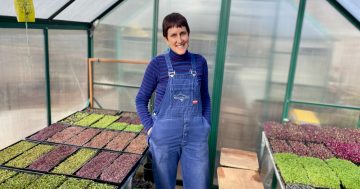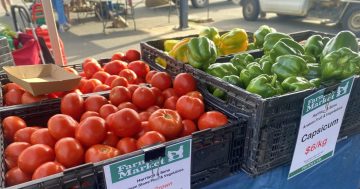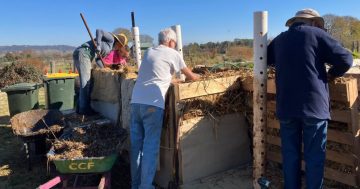
The ACT Government is looking into co-locating urban agriculture programs at Canberra’s heritage sites, such as Lanyon Homestead. Photo: ACT Government.
Lanyon Homestead, Mugga Mugga Cottage and Carlthorpes House could soon be used to grow Canberra produce and upskill locals as part of an investigation into expanding urban agriculture in the Capital.
Yerrabi Greens MLA Andrew Braddock introduced a motion to the Legislative Assembly calling on the ACT Government to investigate opportunities for urban agriculture programs centred on Canberra’s heritage homesteads.
“Not only the direct impact of giving people access to fresh and nutritious food, but also the connection to the soil and the land can deliver broader positive life outcomes,” he said.
“I’ve asked the ACT Government to look into these sites with a view to developing some new programs to help Canberrans learn how to grow food locally and possibly even establish their own small businesses.”
The option was referred to in the draft Canberra Region Local Food Strategy.
Mr Braddock argued heritage sites were a good place to start, given they had been designed for agriculture when first built.
“Heritage is preserved when locations are continued to be used through purpose for which they were originally designed,” he said.
“[Urban agriculture programs] will empower everyone in our community, but particularly those facing difficult times, to grow local food while making a connection to land and a connection to community.
“We have the space and the tools. We now need to put them to work.”
It’s a stance echoed by Ainslie Urban Farm owner Fiona Buining.
She investigated ways urban farming could provide vocational pathways for aspiring growers through a Churchill Fellowship, and said Canberra needed hands-on training programs for people to learn how to grow food – for themselves and as a business.
Ms Buining, who runs her business on a quarter-acre block, argued there was plenty of land available around the Capital to enable people to start businesses.
“For example, most shopping centres have land nearby where you could set up intensive vegetable plots,” she said.
“One acre is enough for two people to grow and run a business on.
“I’m regularly driving around Canberra and seeing land, going ‘that could be an urban farm, that could be an urban farm’ … instead of mowing it, it could be used to grow food.”
Ms Buining said the first step was to identify land suitable for growing food and preserving it for that purpose, then starting programs to give people the confidence and skills to become urban farmers.
She said growing food in our towns and cities cut emissions by shortening the supply chain, provided food with higher nutritional value, provided mental health benefits, improved skills, and also encouraged people to eat better.
“By growing the food, you’re connected to it and so you’re more likely to eat it,” Ms Buining said.
“We could have so much food growing in Canberra.”
Excess food could also then be given to people in need or food pantries.
Mr Braddock’s motion received tri-partisan support, with Business Minister Tara Cheyne stating many of Canberra’s homesteads were currently operating as cultural and tourism sites with educational and heritage focussed programs, and had rich agricultural, pastoral and Aboriginal history.
“The CFC (Cultural Facilities Corporation) is currently exploring food production ideas that demonstrate environmentally sustainable practices, provide social participation, employment, and education and training opportunities, and showcase socially inclusive models,” she said.
“The purpose of such projects is to increase social and economic participation at these important cultural sites, and to also demonstrate the ongoing relevance of heritage places to our communities, and their role in supporting community wellbeing.”
The ACT Government will now investigate suitable opportunities for urban agriculture activities to be co-located with heritage sites, with a view to develop programs which offer diversionary pathways for people in the criminal justice system or otherwise experiencing poverty, encourage small business, and extend tertiary education programs.
A report from the investigation will need to come back to the Assembly by May, 2024.



















